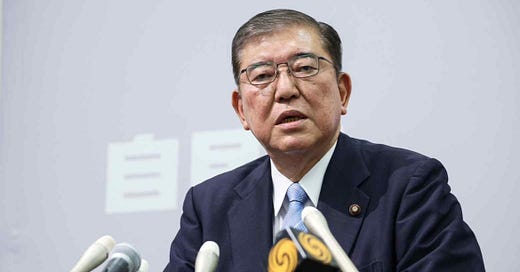Shigeru Ishiba’s Scandal-Plagued Premiership Is Crumbling
Japan’s ruling LDP has been set back by a breakdown in public trust in the party’s integrity.
On October 7, Japanese Prime Minister Shigeru Ishiba begrudgingly confirmed to reporters that his political faction in the ruling Liberal Democratic Party mishandled party funds in an apparent, “accounting error.” A day later, Tokyo-based newspaper The Asahi Shimbun made headlines by publishing a report detailing how 24 of Ishiba’s ministers had connections to the Unification Church, a right-wing religious cult with bizarre ties to the assassination of former Prime Minister Shinzo Abe. Barely a month into Ishiba's administration, and just days after his party suffered losses in his snap election, it has become clear that priority number one is not defense policy or foreign affairs, but damage control.
The recent revelation of governmental connections to the Unification Church, now called the Family Federation for World Peace and Unification, is particularly concerning. Founded in Seoul, South Korea by Sun Myung Moon in 1954, the organization is a zealous offshoot of traditional Christianity. This includes reframing spiritual warfare as an ideological conflict between democracy and communism. Moon, who proclaimed to be the second coming of Jesus Christ, espoused controversial beliefs, such as professing that the Holocaust was necessary to prepare for the Lord’s dominion on earth. The church’s followers, informally known as, ‘Moonies,’ have expectedly developed a reputation for political extremism and radicalization.
A total of 24 ministers, including finance chief Hiroaki Saito, were discovered to have ties to the fundamentalists in the investigation by The Asahi Shimbun. Responding directly to the paper, the finance minister said, “I was aware that this had become a social issue, but I didn’t fully understand the implications of and had asked for support as I had from other religious and civic organizations”
The budgeting mishap from early October was largely overshadowed by the Unification Church ties, although it is just as noteworthy. Between 2019 and 2021, Prime Minister Ishiba’s coalition in the party had failed to disclose 800,000 yen from fundraising, raising even more questions about the LDP’s financial integrity. Japanese law requires that any amount of money donated to a political organization must be available for public record, as well as the contributor’s identity. Furthermore, corporate donations are outright banned. “It was an administrative error, and I take this matter seriously,” Ishiba told the press.
To his credit, Ishiba is taking these matters seriously. On October 6, the new prime minister told party members that certain candidates involved in the recent slush money scandal would not receive an official LDP endorsement. So far, the list includes six parliamentarians, including two members from Tokyo. “I supported Ishiba with my heart and soul in the party leadership contest. Now, I am being given a raw deal,” one member told The Asahi Shimbun. “I cannot stand the LDP being like this.”
Despite the small number of officials receiving discipline, Ishiba’s actions have proven quite unpopular with the rank-and-file, particularly regarding the timing of the decision. “Campaign broadcasts were recorded yesterday,” Shinji Inoue, head of the Tokyo chapter, told The Asahi Shimbun. “We have received voices of discontent and dissatisfaction from constituencies of those [who will not be endorsed.] I wonder if the decision could not have been made sooner.”
Corruption is a theme that is becoming all too familiar for LDP administrations. This past January, high-level party members in several political factions, including the powerful Seiwa Kai, were caught violating Japan’s campaign finance laws to the tune of 600 million yen. Coincidently, it was also the catalyst that led to Ishiba’s rise, as the controversy eventually forced Prime Minister Fumio Kishida’s resignation. The pattern of wrongdoing that is already emerging from the new prime minister’s administration is as concerning as it is typical for LDP governments. However, perhaps the result of this political recklessness speaks for itself.
On October 27, Ishiba’s coalition was defeated in the snap election he had previously called, marking perhaps the beginning of the end for the new prime minister's scandal-plagued tenure. It was a stunning rebuke of a party that has dominated Japanese politics since the 1950s, however, it was also a rebuke of Ishiba’s inability to fix the LDP. “The public hoped for him to fix the LDP, but they are gradually becoming disappointed with the fact that he is becoming more like the LDP,” Izuru Makihara, a professor at the University of Tokyo, told the Washington Post.
Prime Minister Ishiba maintains confidence that his governing coalition can survive with some minor political tweaks, but the situation is looking increasingly dire. In an ironic twist, it appears that the same flurry of scandals that lifted Ishiba up could also be tearing him down.
Editorial contributions by Rachael Rhine Milliard
The views and information contained in this article are the author’s own and do not necessarily represent those of The Asia Cable.



